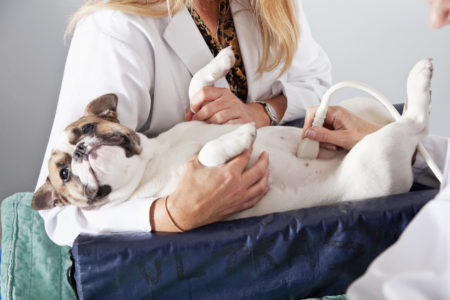E-cigarettes have become increasingly popular among people who formerly smoked cigarettes because of the belief that these devices, as well as vapes, are safer than cigarettes. There has been a lot of debate about the safety of battery-powered smoking devices, and now, that debate is extending to our pets. While it is true that these devices reduce health risks for people, that isn’t necessarily true for animals. VRC wants all pet owners to understand the risks that e-cigarettes pose to their pets.
Dangers of Nicotine to Pets
Nicotine toxicity is a major problem for pets in homes where there is any kind of smoking or nicotine products. Pets that are exposed to nicotine through cigarettes, cigars, e-cigarettes, nicotine patches, nicotine gums, and any insecticides that include nicotine are at risk for nicotine poisoning. However, e-cigarettes contain a lot more nicotine than most of the other products that contain the substance. This means that e-cigarettes can actually be more dangerous for pets than regular cigarettes.
Mild nicotine poisoning can lead to drooling, vomiting, nausea, diarrhea, agitation, and increased heart rate. Severe poisoning may cause tremors, seizures, depression, lethargy, ataxia, coma, as well as elevated heart and respiratory rates. Without treatment, cardiac arrest and respiratory failure may occur, which can be deadly. Symptoms can appear within 15 to 60 minutes of ingestion of nicotine.
Dangers of E-Cigarettes
Nicotine in any amount can be dangerous, but nicotine gum, nicotine patches, cigarettes, and loose tobacco can cause severe nicotine poisoning. However, e-cigarettes contain liquid nicotine that can be absorbed through your pet’s digestive system as well as the skin and mucous membranes. When nicotine is absorbed through mucous membranes or skin, it doesn’t pass through the liver, so more nicotine enters the bloodstream, which increases the risk for nicotine poisoning.
The way e-cigarettes are packaged could also contribute to problems. The liquid nicotine cartridges carry between six and 24 milligrams of nicotine, which is equivalent to one or two traditional cigarettes. The cartridges are then sold in boxes of five to 100 cartridges. This means that your pet could potentially have access to a very large amount of nicotine. Further, consider the size of your pet. If you have a large pet who gets into one cartridge, there may not be much of a problem. If you have a small pet who gets into a whole pack, you are going to be looking at a severe poisoning. In fact, in very small pets, even one cartridge could lead to a serious illness.
Refilling these cartridges can further complicate matters. Some people purchase nicotine solutions where they can refill their own cartridges. This liquid is generally concentrated, and the user can dilute it as they see fit. That means that these refills could contain larger doses of nicotine. Additionally, if your pet gets into liquid before it has been diluted, there could be dire consequences for your pet. The large concentration of nicotine poses a much bigger threat to pets than a single cigarette or even a regular e-cigarette cartridge.
In addition, nicotine cartridges are often flavored which can be another dangerous aspect. The flavoring can make the liquid smell and taste desirable to pets, which might draw your pet toward investigating the liquid.
While nicotine is the biggest threat to your pet when it comes to e-cigarettes, there are other potential hazards as well. Pets are curious, and often use their mouths to explore. Your curious pet might bite or ingest the casing or battery of the e-cigarette. These materials can cause gastrointestinal blockages and irritations. The rechargeable batteries can cause burns due to the caustic substance found inside.
Second-hand smoke is a big problem for pets in smoking households, but not enough research has been conducted to know if e-cigarettes pose any similar problems for pets. It is always a good idea to stay away from your pets while you are smoking.
Treating Nicotine Poisoning
Treating nicotine poisoning can be successful, but seeing a veterinarian right away is necessary. A veterinarian will attempt to decontaminate your pet by inducing vomiting. Once decontamination has occurred, your pet will be given fluids to ensure that they are hydrated. Additional medications could include anti-vomiting, anti-seizure, blood pressure, heart, and sedation medications. Your dog or cat may also have heart and blood pressure monitoring.
Nicotine poisoning can be fatal for dogs and cats. Only nine to 12 milligrams of nicotine can be fatal to pets regardless of what the source of the nicotine is.
Preventing E-Cigarette Problems
The best way to protect your pet is to prevent ingestion of any part of an e-cigarette. To do this, you should keep e-cigarettes and nicotine cartridges away from your pets. To ensure your pet can’t get into anything harmful, consider placing these items in a drawer or cabinet that is inaccessible to your pet. If your pet is a skillful snooper, you might want to buy childproof locks for the cabinet or drawer. While you are at it, keep all products that contain nicotine in this spot.
Even a pet with the most diligent owner might find a way to get into something containing nicotine. If your pet starts displaying the symptoms of nicotine poisoning, you should seek veterinary care right away. If you are in the area, give VRC a call today at 610-647-2950 or stop by with your pet. Our emergency clinic is open 24 hours a day, seven days a week to provide emergency medical care to pets no matter what time it is.







 Email
Email





